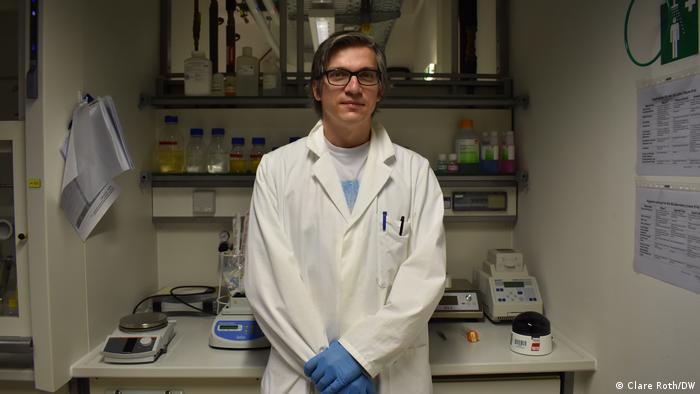
While scavenging through a compost heap at a Leipzig cemetery, Christian Sonnendecker and his research team found seven enzymes they had never seen before.
They were hunting for proteins that would eat PET plastic — the most highly produced plastic in the world. It is commonly used for bottled water and groceries like grapes.
The scientists weren't expecting much when they brought the samples back to the lab, said Sonnendecker when DW visited their Leipzig University laboratory.
It was only the second dump they had rummaged through and they thought PET-eating enzymes were rare.
But in one of the samples, they found an enzyme, or polyester hydrolase, called PHL7. And it shocked them. The PHL7 enzyme disintegrated an entire piece of plastic in less than a day.
Two enzymes 'eat' plastic: PHL7 vs. LCC
PHL7 appears to 'eat' PET plastic times faster than LCC, a standard enzyme used in PET plastic-eating experiments today.
To ensure their discovery wasn't a fluke, Sonnendecker's team compared PHL7 to LCC, with both enzymes degrading multiple plastic containers. And they found it was true: PHL7 was faster.
"I would have thought you'd need to sample from hundreds of different sites before you'd find one of these enzymes," said Graham Howe, an enzymologist at Queens University in Ontario, Canada.
Howe, who also studies PET degradation but was not involved in the Leipzig research, appeared to be amazed by the study published in Chemistry Europe.
"Apparently, you go to nature and there are going to be enzymes that do this everywhere," said Howe.
PET plastic is everyone
Although PET plastic can be recycled, it does not biodegrade. Like nuclear waste or a nasty comment to your partner, once PET plastic is created, it never really goes away.
It can be refashioned into new products — it's not hard to create a tote bag from recycled water bottles, for example. But the quality of the plastic weakens with each cycle.
So, a lot of PET is eventually fashioned into products like carpets and — yes — an exorbitant number of tote bags that end up in landfill sites.
There are two ways to look at solving this problem: The first is to stop production of all PET plastic.
But the material is so common that even if companies stopped producing it immediately, there would still be millions of empty soft drink bottles — or tote bags fashioned from those bottles — lying around for thousands of years.